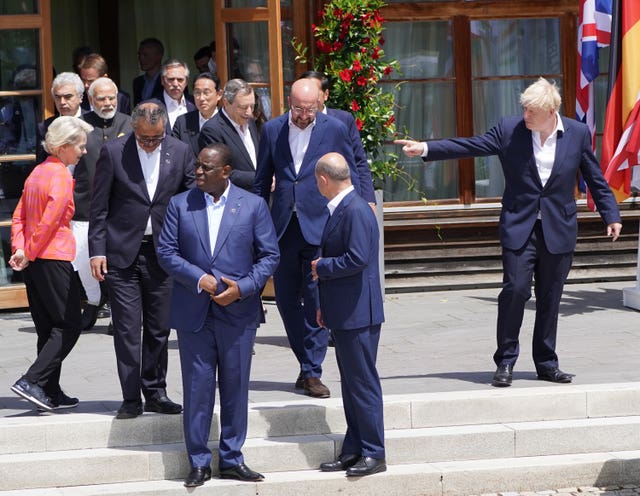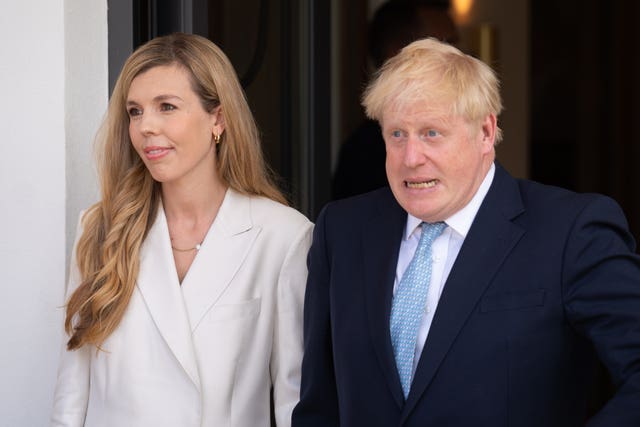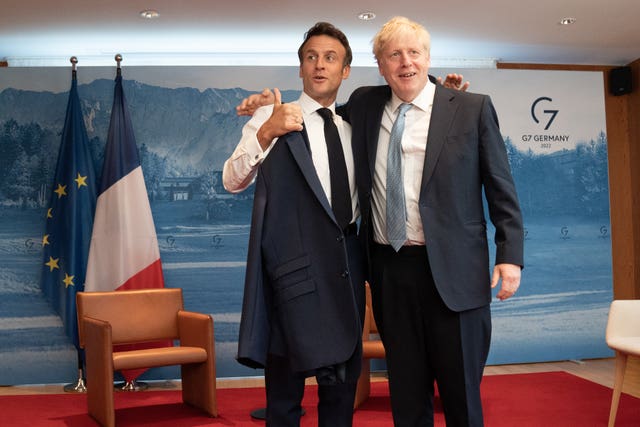Boris Johnson has said the “price of freedom is worth paying” and the UK must be prepared to support Ukraine’s fight against Russia for as long as it takes despite the cost.
The Prime Minister argued that Western allies must continue to back Ukraine because standing up against Vladimir Putin’s aggression will ultimately make the world a safer and more prosperous place.
The conflict in Ukraine has added to the rising cost of living by exacerbating turbulence in international energy prices and causing food shortages due to supplies of grain being prevented from leaving the country’s ports by Russia’s Black Sea fleet.
But speaking at the G7 summit in Germany, Mr Johnson said those pressures will start to ease and the long-term economic impact of defending the rules-based system of international conduct will be beneficial to the global economy.
If Mr Putin is not resisted, it could give the green light to countries such as China to pursue their own goals of territorial expansion, he suggested.
The UK has so far contributed around £1.5 billion of economic and humanitarian support to Ukraine plus some £1.3 billion of military assistance.

The Prime Minister told the BBC at the summit in the Bavarian Alps: “I think that the economic impacts on the UK will start to abate, we’ll find ways around things and some of the cost pressures will start to come down.
“But just in terms of staying the course, imagine if you didn’t. Imagine if we allowed Putin to get away with the violent acquisition of huge chunks of another country, a sovereign, independent territory – the lessons for that would be absolutely chilling in all of the countries of the former Soviet Union, you can see what’s happening in the Baltic countries already.
“But the read across would also be felt in east Asia, as well.
“So, in terms of the economic effects of that, that would mean long-term instability, it would mean anxiety across the world.”
Comparing the situation to the defeat of Nazi Germany, Mr Johnson declined to put a limit on UK support.
“The point I would make to people is, I think that sometimes the price of freedom is worth paying.
“And just remember, it took the democracies, in the middle of the last century, a long time to recognise that they had to resist tyranny and aggression.
“It took them a long time, it was very expensive.
“But what it bought in the end, with the defeat of the of the dictators, particularly of Nazi Germany, it bought decades and decades of stability, a world order that relied on a rules-based international system.
“And that is worth protecting, that is worth defending, that delivers long-term prosperity.”

Mr Johnson’s comments came on the day that Ukrainian President Volodymyr Zelensky addressed the leaders of the UK, US, Canada, Japan, France, Germany and Italy by video-link from Kyiv as they gathered in the luxury Schloss Elmau resort.
Mr Zelensky urged them to be “partners, not observers” and provide the military equipment his country needs.
Mr Johnson, who has warned about “fatigue” around the world putting support for Ukraine in jeopardy as the conflict with Russia drags on, stressed there is unity among the G7 nations.
There had been concerns that France’s Emmanuel Macron – who has repeatedly held talks with Mr Putin and warned that any peace deal must not leave Russia humiliated – had been wavering in support for a protracted conflict.
But Downing Street insisted there is no dispute between the UK and France over the issue, with the two leaders on the same page over Ukraine and their friendly relationship characterised as “Le Bromance” by No 10 aides.

Mr Johnson said the military situation is “very difficult” but Kyiv’s forces have demonstrated an “incredible ability to push back”.
At the summit:
– The UK pledged £10 million to repair damaged Ukrainian rail infrastructure to create an overland route to get grain out of the country.
– The Government will also put £1.5 million to develop a testing process to identify whether grain sold by Russia on the world market has been illegally taken from Ukraine.
– The leaders are considering putting a price cap on Russian oil to further cripple the economy bankrolling the war effort.
Eindrücke von Tag 1 des G7 Gipfels in ElmauImpressions of day 1 of the G7 Summit in Elmau#g7 #g7ger #g7summit pic.twitter.com/hEIZVaG638
— G7 GER (@G7) June 26, 2022
Mr Zelensky is understood to have told G7 leaders not to let the conflict in his country “drag on over winter”, adding: “If Ukraine wins, you all win.”
And in a sign that he is not willing to back down and accept a peace deal that gives up swathes of Ukraine to Russia, he said: “We will only negotiate from a position of strength.”
He also called for “modern and effective missile defence systems that can provide peace to Ukrainian cities far from the front”, warning that Russia is intensifying its attacks on civilian population centres.
That point was grimly underlined as at least two people were killed and 20 injured in a missile strike on a shopping centre in Kremenchuk.
In a joint statement, the G7 said: “We will continue to provide financial, humanitarian, military and diplomatic support and stand with Ukraine for as long as it takes.
“As we do so, we commit to demonstrate global responsibility and solidarity through working to address the international impacts of Russia’s aggression, especially on the most vulnerable.”




Comments: Our rules
We want our comments to be a lively and valuable part of our community - a place where readers can debate and engage with the most important local issues. The ability to comment on our stories is a privilege, not a right, however, and that privilege may be withdrawn if it is abused or misused.
Please report any comments that break our rules.
Read the rules hereLast Updated:
Report this comment Cancel